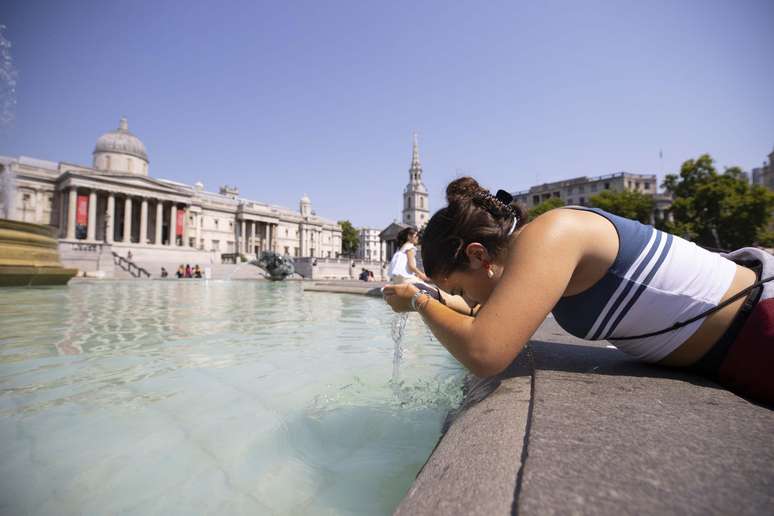Heatwaves are among the leading causes of climate-related death; the elderly and children are more vulnerable to impacts
html[data-range=”xlarge”] figure image img.img-95ba6005ff0b8d8925895727ad0a4465tskzp5zj { width: 774px; height: 516px; }HTML[data-range=”large”] figure image img.img-95ba6005ff0b8d8925895727ad0a4465tskzp5zj { width: 548px; height: 365px; }HTML[data-range=”small”] figure image img.img-95ba6005ff0b8d8925895727ad0a4465tskzp5zj, html[data-range=”medium”] figure image img.img-95ba6005ff0b8d8925895727ad0a4465tskzp5zj { width: 564px; height: 376px; }HTML[data-range=”small”] .article__image-embed, html[data-range=”medium”] .article__image-embed { width: 564px; margin: 0 auto 30px; }
A heat wave record in northern hemisphere countries draws attention to the impact of extreme temperatures in human health. The term that defines this situation is “thermal stress“, identified in people exposed to environments above 35ºC, especially if associated with high humidity.
This condition is related to several serious health problems, and according to United Nations (UN), is a leading cause of climate-related death. A recent study proved just that Last year’s heat wave is linked to the deaths of more than 61,000 people in Europe.
The number of people exposed to heat waves has grown exponentially with the advancement of climate changeswhere extreme events are more frequent and intense. In the last week, the global temperature has broken records. OR Extreme heat has hit countries on several continents in recent days, such as Morocco, Japan, Italy and the United Stateswith temperatures above 40ºC, with forecasts of up to 54ºC in a North American desert.
A World Health Organization (WHO) has highlighted in recent years that exposure to extreme heat causes a variety of symptoms and problems. It can also aggravate health conditions in people with diabetes, asthma, and cardiovascular, pulmonary, renal, endocrine, and psychiatric diseases.
According to the health agency, people with chronic illnesses who need to take medications daily are at a higher risk of complications and death during a heat wave. This risk is also higher for the elderly, pregnant women and children. Furthermore, excessive heat increases the risk of accidents and infectious diseases.
Heatstroke – when the body temperature exceeds 40ºC – is one of the most obvious impacts and can even lead to fainting. due to the body’s inability to balance high temperatures. Other symptoms highlighted by WHO are swelling of the lower limbs, allergies, cramps, headaches, skin rashes, irritability, weakness and lethargy.
An important point to note is that the effects can appear suddenly. Therefore, experts emphasize the need for the population to be aware of symptoms and take basic care, such as avoiding excessive sun exposure, hydrating frequently, and using light clothing and sunscreen, among others. Also, in case of heatstroke, it is advisable to consult a doctor.
Indirectly, other impacts of heatwaves can affect health, such as increased transmission of infectious diseases (such as malaria, dengue, cholera and tuberculosis), increased exposure to environmental toxins (such as through algal blooms ), among others. Furthermore, this situation can lead to water and energy shortages in the face of high demand, which also has significant health consequences.
How to reduce the risks? the doctors respond
Some precautions can reduce health risks on days of high temperatures, with hydration, the use of light clothes and the possibility of not being exposed to the most extreme heat periods. In addition, certain signs must be observed so that the condition does not worsen.
cardiologist at Hcor and sports medicine, Christine Miragre comments that vasodilatation caused by high temperature tends to cause, for example, a drop in blood pressure, which causes malaise, dizziness and a feeling of fatigue. “If people don’t hydrate properly, they can get dehydrated, causing rapid heartbeat,” she adds.
The heart needs to “work” harder on hot days. In the case of people with high blood pressure or certain heart conditions, this can lead to greater overload. “The higher the temperature, the higher the risk of heat complications in the body, people can feel sick even at rest,” explains the doctor.
The cardiologist points out that a key point is the hydration. In the case of physical activities, the person should avoid efforts at high temperatures. The guideline is to opt for periods in which the weather is mild, as exercise causes an increase in body temperature. “OR intense effort at very high temperatures compromises the body’s thermoregulation, which can even lead to loss of consciousness,” he explains.
Director of Brazilian Association of Allergy and Immunology (ASBAI), Eli Mansur stresses that the elderly and children should pay special attention. Not just because they’re a higher-risk population, but because they’re less likely to identify a need to hydrate.
“Children and the elderly don’t have such efficient thermal regulation,” he points out. The doctor also specifies that, when you are indoors, you must also pay attention to the maintenance of air conditioning and environments, to avoid allergies.
Source: Terra
Ben Stock is a lifestyle journalist and author at Gossipify. He writes about topics such as health, wellness, travel, food and home decor. He provides practical advice and inspiration to improve well-being, keeps readers up to date with latest lifestyle news and trends, known for his engaging writing style, in-depth analysis and unique perspectives.








